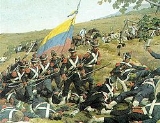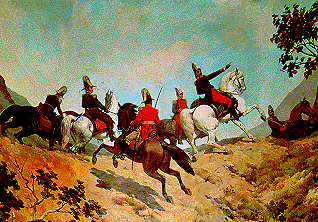
Battle of Carabobo
Encyclopedia
The Battle of Carabobo, 24 June 1821, was fought between independence fighters, led by Simón Bolívar
, and the Royalist forces, led by Spanish Field Marshal Miguel de la Torre
. Bolívar's decisive victory at Carabobo
led to the independence of Venezuela
.
 The Royalists occupied the road leading from Valencia
The Royalists occupied the road leading from Valencia
to Puerto Cabello
. As Bolívar's force of 6,500 approached the Royalist position, Bolívar divided his force and sent half on a flanking maneuver through rough terrain and dense foliage. De la Torre likewise split his force and sent half to deal with this flank attack. Hitting the Patriots with musket fire, the Royalists held back the attack for a while. The Venezuelan infantry failed and retreated, but the men of the "British Legions
", among them many members of the former King's German Legion
, fought hard and took the hills. They sustained about 50% of Bolívar's casualties. The Patriots eventually broke through the Royalist lines on the flank and marched towards the rear of de La Torre's force. The Spanish infantry formed squares and fought to the end under the attack of the Patriot cavalry. The rout was so bad that only some 400 of one infantry regiment managed to reach safety at Puerto Cabello
. With the main Royalist force in Venezuela crushed, independence was ensured. Subsequent battles included a key naval victory for the independence forces on 24 July 1823 at the Battle of Lake Maracaibo
and in November 1823 José Antonio Páez
occupied Puerto Cabello, the last Royalist stronghold in Venezuela.
 24 June is celebrated as Battle of Carabobo Day .This day is also called "Army Day" in Venezuela.
24 June is celebrated as Battle of Carabobo Day .This day is also called "Army Day" in Venezuela.
Simón Bolívar
Simón José Antonio de la Santísima Trinidad Bolívar y Palacios Ponte y Yeiter, commonly known as Simón Bolívar was a Venezuelan military and political leader...
, and the Royalist forces, led by Spanish Field Marshal Miguel de la Torre
Miguel de la Torre
Miguel de la Torre y Pando, conde de Torrepando was a Spanish General, Governor and Captain General, who served in Spain, Venezuela, Colombia and Puerto Rico during the Spanish American wars of independence and after.At the age of fourteen he joined the Spanish Army as a soldier during the War of...
. Bolívar's decisive victory at Carabobo
Carabobo
Carabobo State is one of the 23 states of Venezuela, located in the north of the country, about two hours by car from Caracas. The capital city of this state is Valencia, which is also the country's main industrial center. The state's area is 4,650 km² and had an estimated population of...
led to the independence of Venezuela
Venezuela
Venezuela , officially called the Bolivarian Republic of Venezuela , is a tropical country on the northern coast of South America. It borders Colombia to the west, Guyana to the east, and Brazil to the south...
.
Army of Gran Colombia
- Commander in Chief: Gen. Simon Bolivar
- 1st Army Division (Commander: Gen. Jose Antonio Paez)
- 1st Infantry Brigade
- Apure Braves
- British LegionsBritish LegionsThe British Legion or British Legions were foreign volunteer units that fought under Simón Bolívar against Spain for the independence of Colombia, Venezuela, Ecuador, and Peru. The Venezuelans called them the Albion Legion...
- 1st Cavalry
- Honor, Paez's Own Lancers
- Honored Lancers, The Death
- Valiant Horse Rifles, The Vengeance
- 1st Infantry Brigade
- 2nd Army Division (Commander: Gen. Manuel Cedeno)
- 2nd Infantry Brigade
- Vargas
- Boyaca
- Tiralleurs Battalion
- Sacred Cavalry Squadron
- 2nd Infantry Brigade
- 3rd Army Division (Commander: Gen. Ambrocio Plaza)
- 3rd Infantry Brigade
-
- Victors of Boyaca Battalion
- Foot Grenadiers
- Rifle Regiment
- Anzoátegui Regiment
-
- 2nd Cavalry
- Dragoons
- Hussars
- Horse Guards
- 3rd Infantry Brigade
Royalist Army
Commander in Chief of the Royal Armies: General en Chief Juan Miguel de la Torre- Division Commanders: Gen. Morales, Cols. Herrera and Garcia
- Infantry Battalions attached under the three divisions:
-
- Garcia Division: 1st Infantry Brigade
- 4th Division: The Prince's Own Foot
- Morales Division: Morales Combined Brigade
-
- 2nd Valencay Infantry
- Barbastro Regiment
- Burgos Regiment
- Hostalrich Foot
- Infante Don Francisco
- Principe
- Cavalry Brigade
- General's Bodyguards
- Loyal Dragoons
- HM King Ferdinand VII's Own Hussars
- King's Own Lancers
- 2 artillery pieces, each attached to the Garcia and the 4th Divisions
-
History

Valencia, Venezuela
Valencia is the capital city of Carabobo State, and the third largest city of Venezuela.The city is an economic hub that contains Venezuela's top industries and manufacturing companies. The population of Valencia reached some 1.5 million in the year 2003, and it is expected to grow dramatically...
to Puerto Cabello
Puerto Cabello
Puerto Cabello is a city on the north coast of Venezuela. It is located in Carabobo State about 75 km west of Caracas. As of 2001, the city has a population of around 154,000 people. The city is the home to the largest port in the country and is thus a vital cog in the country's vast oil...
. As Bolívar's force of 6,500 approached the Royalist position, Bolívar divided his force and sent half on a flanking maneuver through rough terrain and dense foliage. De la Torre likewise split his force and sent half to deal with this flank attack. Hitting the Patriots with musket fire, the Royalists held back the attack for a while. The Venezuelan infantry failed and retreated, but the men of the "British Legions
British Legions
The British Legion or British Legions were foreign volunteer units that fought under Simón Bolívar against Spain for the independence of Colombia, Venezuela, Ecuador, and Peru. The Venezuelans called them the Albion Legion...
", among them many members of the former King's German Legion
King's German Legion
The King's German Legion was a British Army unit of expatriate German personnel, 1803–16. The Legion achieved the distinction of being the only German force to fight without interruption against the French during the Napoleonic Wars....
, fought hard and took the hills. They sustained about 50% of Bolívar's casualties. The Patriots eventually broke through the Royalist lines on the flank and marched towards the rear of de La Torre's force. The Spanish infantry formed squares and fought to the end under the attack of the Patriot cavalry. The rout was so bad that only some 400 of one infantry regiment managed to reach safety at Puerto Cabello
Puerto Cabello
Puerto Cabello is a city on the north coast of Venezuela. It is located in Carabobo State about 75 km west of Caracas. As of 2001, the city has a population of around 154,000 people. The city is the home to the largest port in the country and is thus a vital cog in the country's vast oil...
. With the main Royalist force in Venezuela crushed, independence was ensured. Subsequent battles included a key naval victory for the independence forces on 24 July 1823 at the Battle of Lake Maracaibo
Battle of Lake Maracaibo
The Battle of Lake Maracaibo also known as the "Naval Battle of the Lake" was fought on 24 July 1823 in Venezuela's Lake Maracaibo between Admiral José Prudencio Padilla and royalist Captain Ángel Laborde....
and in November 1823 José Antonio Páez
José Antonio Páez
José Antonio Páez Herrera was General in Chief of the army fighting Spain during the Venezuelan Wars of Independence, in addition to becoming the President of Venezuela once it was independent of the Gran Colombia...
occupied Puerto Cabello, the last Royalist stronghold in Venezuela.
Commemoration

General
- Venezuela on Encyclopedia of Days
- Carabobo 1821 on Prodiseño Escuela de Comunicación Visual y Diseño
- Bolivar's British Legion by Ian Fletcher from Ian Fletcher Battlefield Tours
- Pages of Glory on Simón Bolívar, The Southamerican Washington from Don Mabry's Historical Text Archive.

